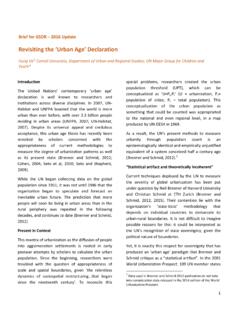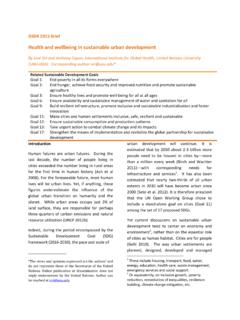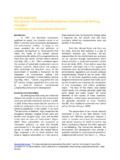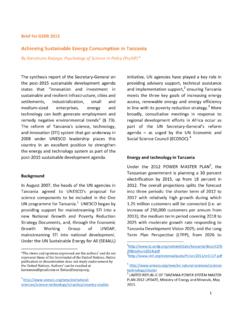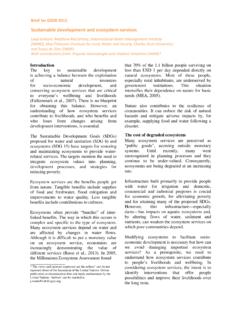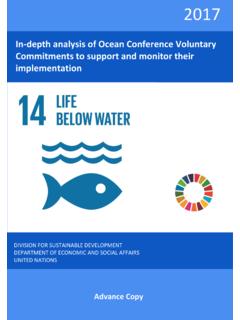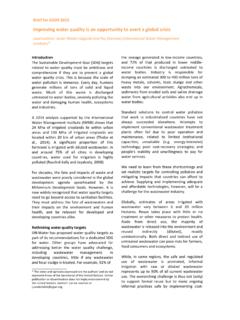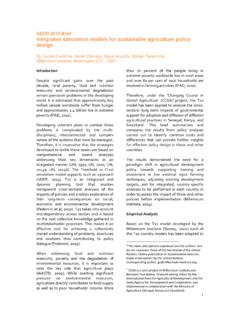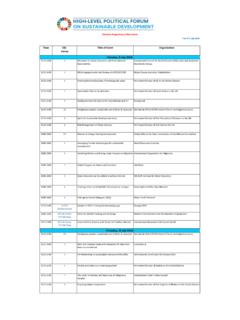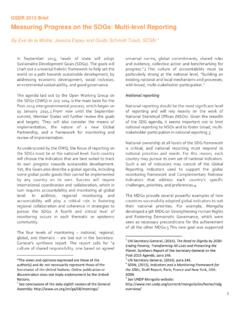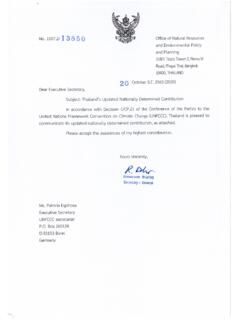Transcription of THE POTENTIAL OF THE BLUE ECONOMY - United Nations
1 Increasing Long-term Benefits of the Sustainable Use of Marine Resources for Small Island Developing States and Coastal Least Developed CountriesBLUE ECONOMY THE POTENTIAL OF THE THE POTENTIAL OF THE blue ECONOMY Increasing Long-term Benefits of the Sustainable Use of Marine Resources for Small Island Developing States and Coastal Least Developed Countries 2017 International Bank for Reconstruction and Development/The world Bank 1818 H Street NW Washington DC 20433 Telephone: 202-473-1000 Internet: This report is the product of a collaborative effort amongst relevant bodies and agencies of the United Nations system and other stakeholders, which was led by the world Bank Group and United Nations Department of Economic and Social Affairs (DESA).
2 The following bodies and agencies contributed to this publication: UN Environment (UNEP), Food and Agriculture Organization (FAO), International Maritime Organization (IMO), Office of Legal Affairs/ UN Division for Ocean Affairs and the Law of the Sea (OLA/ DOALOS), Office of the High Representative for the Least Developed Countries, Landlocked Developing Countries and Small Island Developing States (OHRLLS), UN Conference on Trade and Development (UNCTAD), United Nations Development Programme (UNDP), United Nations Industrial Development Organization (UNIDO), United Nations world tourism Organization (UNWTO)
3 , International Union for Conservation of Nature (IUCN), world Trade Organization (WTO), International Council for Science (ICSU), Organisation for Economic Co-operation and Development (OECD), world Ocean Council (WOC), world Wide Fund for Nature (WWF), Conservation International, Ocean Policy Research Institute (OPRI), National Oceanic and Atmospheric Administration (NOAA), and the International Seabed Authority (ISA). The findings, interpretations, and conclusions expressed in this work do not necessarily reflect the views of The world Bank, its Board of Executive Directors, or the governments they represent.
4 Rights and Permissions The material in this work is subject to copyright. Because The world Bank encourages dissemination of its knowledge, this work may be reproduced, in whole or in part, for noncommercial purposes as long as full attribution to this work is given. Any queries on rights and licenses, including subsidiary rights, should be addressed to world Bank Publications, The world Bank Group, 1818 H Street NW, Washington, DC 20433, USA; fax: 202-522-2625; e-mail: Suggested citation: world Bank and United Nations Department of Economic and Social Affairs. 2017. The POTENTIAL of the blue ECONOMY : Increasing Long-term Benefits of the Sustainable Use of Marine Resources for Small Island Developing States and Coastal Least Developed Countries.
5 world Bank, Washington DC. Cover photo credits: Charlotte de Fontaubert and Flore de Preneuf/ world Bank Cover design: Greg Wlosinski/General Services Department, Printing and Multimedia/ world BankiiiACKNOWLEDGMENTSThis report is the product of a collaborative effort amongst relevant entities of the United Nations system and other stakeholders, which was led by the world Bank Group and UN Department of Economic and Social Affairs (DESA). The UN General Assembly adopted resolution 70/226 on December 22, 2015 in which it decides to convene the high-level United Nations Conference to Support the Implementa-tion of Sustainable Development Goal 14: Conserve and sustainably use the oceans, seas and marine resources for sustainable development to support the implementation of Sustainable Development Goal 14.
6 To support Fiji and Sweden, Presidents of the Conference with tech-nical expert advice for preparing the Conference, an Advisory Group consisting of relevant entities of the United Nations system and other stakeholders was established in April 2016. This Advisory Group agreed to form seven subsidiary informal preparatory working groups (IPWG) in line with the targets under SDG14. Informal Working Group (IPWG) 6 was assigned to cover SDG target and worked on the issue of blue growth and increasing economic benefits for SIDS and LDCs from sustainable management of marine resources, including fisheries, aquaculture and tourism .
7 The world Bank Group and UN DESA were appointed as co-conveners of IPWG 6. The membership of the working group includes: The world Bank Group (WBG), UN Depart-ment of Economic and Social Affairs (DESA), UN Environment, Food and Agriculture Orga-nization (FAO), International Maritime Organization (IMO), UN Office of Legal Affairs/ Division for Ocean Affairs and the Law of the Sea (OLA/DOALOS), UN Office of the High Representative for the Least Developed Countries, Landlocked Developing Countries and Small Island Developing States (OHRLLS), UN Conference on Trade and Development (UNCTAD), United Nations Development Programme (UNDP)
8 , United Nations Indus-trial Development Organization (UNIDO), United Nations world tourism Organization (UNWTO), International Seabed Authority (ISA), International Union for Conservation of Nature (IUCN), world Trade Organization (WTO), International Council for Science (ICSU), Organisation for Economic Co-operation and Development (OECD), world Ocean Council (WOC), world Wide Fund for Nature (WWF), Conservation International, Ocean Policy Research Institute (OPRI) of Sasakawa Peace Foundation, and National Oceanic and Atmospheric Administration (NOAA) of Department of Commerce.
9 These entities con-tributed to and assisted in the development of this report. IPWG 6 undertook relevant research and consultations to evaluate the current status of SDG target and related issues, including challenges, gaps and opportunities in its implemen-tation, and provided recommendations on necessary future actions, partnerships, projects and commitments to accelerate the implementation of SDG target that directly respond to related needs and opportunities. As part of its work, IPWG 6 submitted an informal input to the background note of the Secretary-General for the preparatory meeting of the Confer-ence in November 2016.
10 The informal working group then decided that this input could be optimized to serve an additional purpose. Thus, the group agreed to develop the input into this standalone report with the intention to officially launch it around the Conference in June 2017. The world Bank Group accepted to oversee the production process. The co-conveners of the working group are Mr. Bj rn Gills ter, world Bank Group Spe-cial Representative to the UN in New York, and Ms. Irena Zubcevic, Chief, Small Island Developing States, Oceans and Climate Branch, Division for Sustainable Development, UN Department of Economic and Social Affairs.
